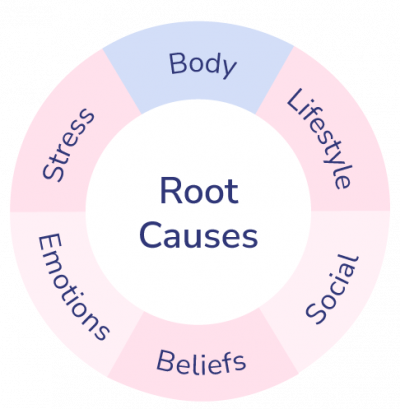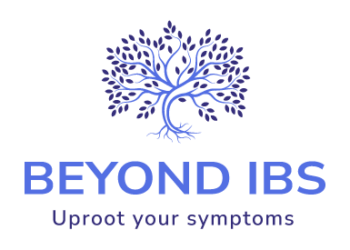A growing new global movement to understand and reverse the why behind symptoms
Read MoreThe why behind IBS
Why IBS symptoms keep returning
It can be confusing and worrying not knowing why you have IBS and why it fluctuates. We can feel powerless over what can be very unpredictable and upsetting symptoms.

You may have explored what’s really causing your IBS and tried to make changes to your diet, exercise routine or how you cope with stress. You may wonder whether it is related to your gut bacteria – or is genetic? You may be reading this because you wonder whether trauma, emotions and stress have played a part.
It can be confusing and worrying not knowing why you have IBS and why it fluctuates. We can feel powerless over what can be very unpredictable and upsetting symptoms.
You may have explored what’s really causing your IBS and tried to make changes to your diet, exercise routine or how you cope with stress. You may wonder whether it is related to your gut bacteria – or is genetic? You may be reading this because you wonder whether trauma, emotions and stress have played a part.

Your body's intelligence
When we don’t know why IBS begun, we are left scrabbling in the dark. Often we end up managing our symptoms and accepting IBS as a lifelong condition.
There is another way. Once we identify our root cause(s) we can address these. Our body can self-heal from most chronic illnesses if we create the right conditions.
Our bodies are highly intelligent. They are so much more than a machine that breaks down. Our bodies have an internal compass that always wants to aim towards health and rebalance. We just need to remove the obstacles.
The bigger picture
It’s very common that we try to find the ‘one thing’ that triggered our IBS symptoms. However there are 6 causes that can trigger (and re-trigger) our symptoms.

It is very common that we try to find the ‘one thing’ that triggered our IBS symptoms. However there are a variety of factors that can trigger (and re-trigger) our symptoms:
- Body – organs in our gut
- Stress
- Emotions
- Beliefs
- Social environment
- Lifestyle

The six root causes
![]() 1. Your body – digestive system
1. Your body – digestive system
Our bodies are always listening and adapting. Every tissue in the body has a specific purpose. The colon, or large intestine, is the digestive organ most commonly associated with IBS. The purpose of the colon is to help us process and eliminate waste. If something in our life feels indigestible, our colon responds to try to help us cope. Experiences can get energetically stuck in our colon.
![]() 2. Stress
2. Stress
Stress is what happens when our bodies react to an external threat or challenge. When we experience a stressor it can change everything: our mood, energy, thoughts, behaviours – and our physical health. Stressful events can be a one-off highly traumatic event or a continual drip-drip effect. Stressors that impact the colon are often experiences that are hard to digest or let go of. This is very much in the eye of the beholder, so a tailored approach is essential. Stressors that have lasting effects on the gut are usually highly emotional, unexpected and involve a sense powerlessness over what is happening.
Examples of stress that can be difficult to digest or let go of:
- Being on the receiving end of other people’s anger
- Having to continually keep the peace and sideline your voice, needs or feelings
- Not being able to express our own anger in a healthy way
- Difficulty coming to terms with painful changes or loss
- Always putting others first
- Unmet needs during childhood
- Hypervigilance, feeling afraid or on eggshells
- Fear of letting go
- Abusive relationships
What in your life has been difficult to digest, process or let go of? What feels unresolved?
Once the colon reacts to an initial stressful event, even when this seems to have passed the emotions/stress can lie dormant in our gut. When the stress is dormant, there is an underlying susceptibility to being re-triggered. New stressors that feel like the original event can spiral us back into how we felt the first time. Symptoms therefore cycle between phases of being active or dormant.
![]() 3. Emotions
3. Emotions
We feel emotions continually, although we often do not focus on them. Emotions, such as sadness, anger, fear and shame are usually a call for our attention. Suppressing or denying them doesn’t make them go away – it can build resentment and affect our health. Unfortunately we’re often not taught how to express these emotions healthily – and we may have learned that it’s not safe to. If we don’t express our emotions, then our unconscious mind will look after it by tucking it away in a pocket in our body for later, when we are ready.
The gut is a common place that we hold unresolved emotions. To understand what your gut might be holding onto, consider a past experience that was upsetting and feel into your body. Is there any emotional charge? What emotion is there? How strong is it from 0 – 10? Are there any physical sensations: a knot or butterflies in your tummy? It is possible to loosen the emotions stuck in our digestive tract and let go of the heavy burdens we carry.
![]() 4. Beliefs
4. Beliefs
Beliefs are ideas we have learned about ourselves, others or the world. They are repetitive thoughts that run in the background, often under our radar – they can be difficult to notice. But they have a big impact on our choices, feelings and behaviours. We can hold beliefs about: our worth, what’s OK and what’s not OK, why things happen to us, how others think, our symptoms and potential recovery and so on…
Beliefs can change. We were not born with them and we can shift limiting beliefs to more empowering ones. When we live through difficult experiences, we can take on new beliefs about the world. This is often done to try to stay safe or avoid future pain.
In relation to the colon we might believe: “I can’t process this, it’s too much”. A belief could also be: “I have to keep the peace”. We might in turn believe we have to hold ourselves inside and forsake our needs to please or placate others. This belief can create feelings of fear, resentment or anger – linking with the emotional root cause. When we hold ourselves in we live in a state of conflict and tension, which can be expressed in our digestive system. If we avoid conflict to keep the peace, we start a war inside ourselves.
Beliefs can re-trigger IBS symptoms and keep us stuck in chronic cycles. If you have a strong belief you want to let go of, ask yourself: how true it is from 0 – 100%? If it’s not 100% there is some wriggle space, which can grow. Instead, consider: what would I like to believe instead?
![]() 5. Social environment
5. Social environment
We are interconnected with our social and environmental surroundings. Our bodies are impacted by toxins in our air as well as toxicity in our relationships, communities and culture.
If we live in an abusive relationship, we are susceptible to events that will trigger and/or re-trigger chronic digestive issues on a regular basis. Recognising and changing real-life stressors in our environment is vital for our health.
Ask yourself: what dynamics in my relationships might be triggering my IBS symptoms? Awareness is a huge step forward in itself.
![]() 6. Lifestyle
6. Lifestyle
There are countless studies that show how a healthy lifestyle can support our health and energy. Vitality supports our body’s natural healing processes.
- Food can be our medicine – or our poison.
- Movement is vital for a healthy bowel. It’s never too late to start physical exercise.
- Mindfulness reduces stress and anxiety.
To address the root causes of your IBS, it’s important to also build on lifestyle, health and vitality. Addressing the root cause asks your body to change, let go and start doing things differently. This requires energy and vitality to move beyond the old chronic IBS cycles.
Gradually and gently, lifestyle change is achievable.
Ask yourself: what one small lifestyle change could I make today that would support my gut health?
Choose something that appeals to you and that feels like a 1% change. Commit to do it for 21 days before making any changes. Remember to give yourself a pat on the back each and every day that you achieve it!
How do stress, emotions, thoughts, lifestyle or relationships affect your IBS?
Take the next step

Explore your ‘why’ at home
A free guide to help you track your symptoms, emotions and/or beliefs. Begin exploring your IBS symptoms using simple steps and self care practices that can be used at home.

Work with me
There are several options from a free no obligation intro call to various plans to dive deep into the root cause of your IBS. Find out how this innovative root cause approach could work for you.
You may also like...
Fire in my belly
Anger is a powerful energy. It can do us harm if we hold it in our body. Holding in anger...
Read MoreDaily reconnection and self care
A daily practice to connect more with your gut and emotions. Begin to loosen the stress and experiences that keep...
Read More


